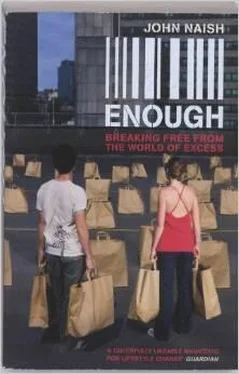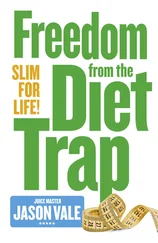John Naish. Enough: Breaking free from the World of Excess
Enough offers a scathing critique of the one rule that always seems to hold in Western societies: “more is always better.” With the help of compelling biological and psychological studies, Enough shows us how our obsession with “more” is actually the source of many of our woes, as well as what we can do about it.

What’s in it for me? Why our desire for more and more stuff is hurting ourselves and the planet.
In the western world, we live under the paradigm of "more is always better." Although most of us have everything we could possibly need, we still believe we always need more to be happy and satisfied. This constant striving for more – information, food, happiness, etc. – causes problems: more and more people are overweight, depressed or in debt, and the ecological system of the earth is out of balance because of human behavior.
John Naish explains the shocking consequences that our culture of excess has on us, and our societies and environment, and shows what everyone can do to change his or her attitude toward consumption and the constant striving for more. By providing easy-to-follow, concrete advice, these blinks enable you to implement the idea of “enoughness” in your life.
In these blinks, you’ll discover:
why stone age man also wanted lots of stuff;
when divorce lawyers are at their busiest; and
what is wrong with all-you-can-eat-buffets.
Clever marketing tricks exploit our natural desire for more and more stuff.
From a big-screen TV to a fridge packed with food, a fancy sports car to the many household appliances that you’ve only used once: the average citizen in Western societies owns or consumes an astonishing amount of stuff.
The reason has to do with the legacy of our evolutionary history: in order to survive and develop as a species, human beings had to be eager to try out new things.
Throughout most of human history food was scarce, and most humans weren’t getting enough. To compensate for this scarcity, our bodies evolved to eat as much as possible when food was available and store the energy when it wasn’t.
Eventually, we learned that collecting and hoarding vast quantities of resources, like food, clothing or tools, would further help us survive times of scarcity.
Another part of this legacy is a desire for both material and nonmaterial goods. Just like we collect material goods, we also collect as much information as possible: our ancestors had to be constantly aware of their surroundings and note every possible detail in order to survive.
Our brains even reward us for our awareness with chemicals called opioidsthat make us feel good.
And while this desire to collect information and things was advantageous for most of human history, today’s advertisers now know how to exploit these ancient mechanisms in order to motivate us to consume more than we actually need:
They can, for instance, exploit our fear of scarcity by creating "limited editions,” thus tricking us into thinking that passing on a chance to buy now will mean losing out on a limited opportunity.
Or they can exploit our desire to emulate society’s most successful members. In the past we would look to the strongest or best-fed members of the group as role-models. Nowadays we look to celebrities who we hope to become by buying the products they’re hawking.
Clearly, the mechanisms that once ensured our survival are problematic in today’s world. Our following blinks will discuss this disconnect in more detail.
We experience information overload every day.
Consider, for a moment, that there are 10 million spam emails sent each day around the world. One consequence is that an undeserving amount of our time is squandered sifting through these unwanted nuisances.
Spam mail, however, is just one example of a wider malaise:
Every day we’re confronted with a deluge of information so overwhelming that it causes us to suffer serious health problems.
An important milestone in our understanding of information overload dates back to 1996 with the discovery of information fatigue syndrome by British neuroscientist Dr. David Lewis. He observed that information overload can lead to exhaustion, insomnia, poorer decision-making skills and can even temporarily lower your IQ!
Much of the information we consume is transferred over video screens, such as computers, televisions, smartphones, etc. This is further problematic, as studies suggest that this type of information consumption might increase ADHD, depression and obesity in children.
As you know from the previous blink, we constantly seek out new information. This ongoing search (especially online) can even transform into a full-blown addiction.
Think about how the conveniences of the virtual world can come to replace “real-life” interactions:
It’s easier to send an email than discuss something face-to-face. Likewise, it’s easier to play videogames than play sports, or watch sitcoms instead of finding stimulation with friends and family.
People can easily become so dependent upon this convenience provided by virtual information that they actually experience real withdrawal symptoms after being away from the web for a few days or even hours.
Fortunately, there are simple ways to avoid the siren song of online data: the data diet.
From time to time, you can take an intentional break from the virtual world in order to keep your sanity. Even Bill Gates does it on a regular basis!
Not only does this data diet help you avoid the pain of information overload, it also helps you be more productive: in essence, the brain is more effective at solving problems when it gets a break from its usual routine.
The availability of food has led to problematic eating habits and a number of health problems.
The all-you-can-eat buffet serves as the perfect symbol for our modern attitude towards food, namely: eat as much as possible for the smallest amount of money.
In the past, taking advantage of any all-you-can-eat opportunity was the difference between life and death. Today, however, the same mechanisms that caused us to take advantage of these opportunities now pose serious health risks.
For example, humans prefer foods with high energy (lots of fat and sugar) – a relic from times when energy was scarce. When we eat high-energy foods, we are rewarded with a jolt of hormones, endogenous opioids, which then encourage us to eat more.
The energy that we can’t immediately use is then stored as fat, providing us with extra resources in order to survive the next famine.
Today, however, these factors become a dangerous mix when food is both available and cheap. The availability of fatty foods means we eat more than we should, which gets stored as fat in our bodies.
It should be no surprise, then, that obesity is a problem in developed societies. In fact, one out of four people in Europe, Australia and North America is obese, and therefore at risk of heart disease, diabetes and cancer.
Adding to this health problem is that most of us have developed counterproductive eating behaviors. Rather than listening to our stomachs, most people rely on visual cues to decide when it’s time to put down the knife and fork.
Take this experiment for example, in which scientists invited students to a dinner in which their big soup bowls were continuously and inconspicuously refilled. Interestingly, without the visual aid of an empty bowl, the students ate much more than they thought they had eaten.
Читать дальше













